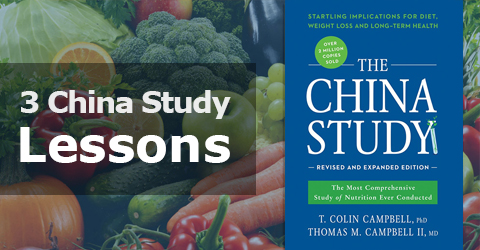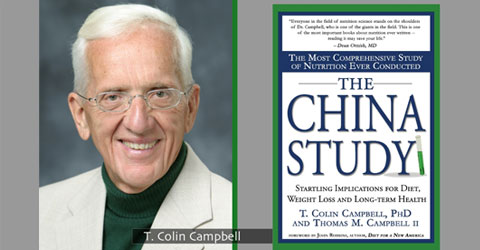

More than 30 years ago, Dr. T. Colin Campbell and his team at Cornell University, in partnership with researchers at Oxford University and the Chinese Government, embarked upon one of the most comprehensive studies of nutrition and health ever conducted. Known as the China Project, this landmark study combined with laboratory findings—conclusively demonstrated the dangers of a diet high in animal protein and the amazing health benefits of a whole food, plant-based diet.
In 2005, Dr. T. Colin Campbell and his son Tom, now a physician, shared those findings with the world in The China Study—one of the most important books ever written about diet and health. In the 13 years since it was published, it has inspired a mountain of research in plant-based nutrition. It has motivated influential figures and celebrities to go plant-based and led to the creation of a Plant-Based Nutrition Certificate Program sought out by physicians, nurses, health coaches, dietitians, and thousands of others. In 2016, The China Study: Revised and Expanded Edition was released featuring brand new content, including the latest undeniable evidence of the power of a plant-based diet. The expanded edition dispels a myriad of nutrition myths and misinformation while offering hope about the future of research and nutrition.
These are three of the book’s most important lessons.
Lesson One: The recommendations from The China Study are not based on one study alone.
The China Project (research study) looked at sixty-five counties across China, using extensive questionnaires and blood tests to gather information on 6,500 adults. When the researchers were done, they had more than 8,000 statistically significant associations between lifestyle, diet, and disease. The China Project was unmatched in terms of comprehensiveness, quality, and uniqueness. The China Study (book) presents Dr. Campbell’s assessment of the “big picture” related to nutrition and health. It is informed by more than a thousand references to health and nutrition studies throughout the world, including the results of The China Project. I cannot emphasize enough that the findings from The China Project, standing alone, do not solely determine Dr. Campbell’s views expressed in the book. The goal of The China Study is to redefine how we think about nutrition information—to eliminate confusion and draw conclusions based on a comprehensive view of the evidence generated by peer-reviewed nutrition research.
Lesson Two: Animal protein and plant protein act very different in the body.
There have been many different kinds of studies for well over a half century showing that animal and plant based proteins differ in their nutritional response because of differing amino acid compositions that have nothing to do with pasteurization, homogenization or contamination with foreign chemicals.” – Dr. T. Colin Campbell Campbell
All forms of animal protein, though there are some differences, act overwhelmingly the same in the body. For example, casein is a dairy protein, and meat is largely made up of the three major proteins in muscle: myofibrillar proteins, sarcoplasmic proteins, and connective tissue or stromal proteins (i.e., collagen). Even with their structural differences, all animal proteins act overwhelmingly the same, a fact well established in the scientific literature. They all have high biological value, meaning they are most efficient at growing cells: all cells, including healthy cells and cancerous cells alike. Casein and egg albumin for instance, both help the young animal grow the fastest. They also stimulate the production of more growth factors, particularly insulin-like growth factor(IGF), which is associated with higher cancer growth rates.
The findings from The China Study indicate that the lower the percentage of animal protein consumed, the greater the health benefits.
Plant proteins do contain all essential amino acids, but not in the same ratio as animal proteins. Thus, plant proteins are said to have “limiting amino acids.” But this turns out to be a good thing. Their limiting amino acids seem to have a protective effect as the amino acids absorbed are not in the ratio most easily used. For that reason, plant proteins do not promote cancer, even if you combine them together in one meal, like rice and beans.
The findings from The China Study indicate that the lower the percentage of animal protein consumed, the greater the health benefits. Even relatively small intakes of animal protein were associated with adverse effects. People who ate the most plant-based foods were the healthiest and tended to avoid chronic disease.
Lesson Three: A whole foods, plant-based diet is demonstrably beneficial for a wide variety of diseases.
Dr. Campbell shares his views on the relationship of disease to diet very succinctly in his 7th Principle of Health, which he shares in The China Study:
Nutrition that is truly beneficial for one chronic disease will support health across the board.
As Dr. Campbell came to understand more about the biochemical processes of various diseases, he also came to see how these diseases had so much in common. Because of these impressive commonalities, it only makes sense that the same good nutrition will generate health and prevent diseases across the board. Even if a whole food, plant-based diet is more effective at treating heart disease than brain cancer (for example), you can be sure that this diet will not promote one disease while it stops another. It will never be “bad” for you. Quite simply, you can maximize health across the board with one simple diet—a whole food, plant-based diet.
In part, because of The China Study, more people are joining the club of the “formerly sick” every day. Over the past decade we have seen a proliferation of books, cookbooks, films, websites, blogs, and practitioners all focused on plant-based nutrition. Their message has been eagerly absorbed by the public, and I am hopeful that this is the just the beginning of the plant-based movement.
Copyright 2026 Center for Nutrition Studies. All rights reserved.
Deepen Your Knowledge With Our
Plant-Based Nutrition
Certificate
Plant-Based Nutrition Certificate
- 23,000+ students
- 100% online, learn at your own pace
- No prerequisites
- Continuing education credits





